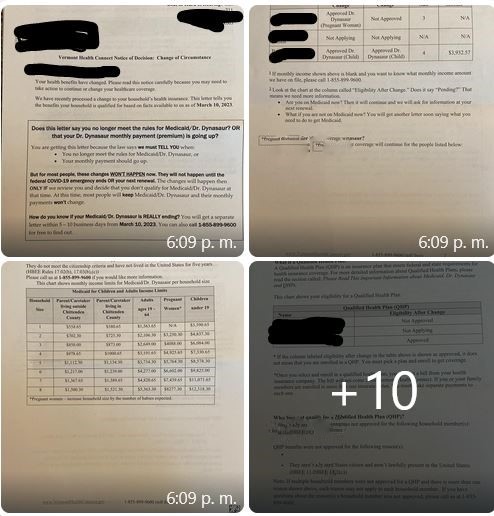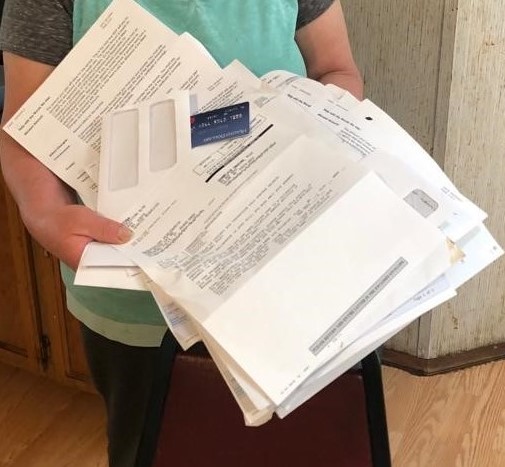

“There are so many pieces of paper to fill out and questions to answer that I am not sure about going to the doctor.”
The volume and complexity of paperwork required to navigate the health care system is a barrier for many especially those with limited reading and writing skills; for those whose first language is not English and/or are unaccustomed to the bureaucracy embedded within the health care system, it can sometimes be the culminating reason that someone delays or even forgoes needed medical care. A young man with whom we have been in touch for the past three months faces myriad barriers in accessing health care services. He works long hours 7 days a week. He is paying off a large debt in Mexico while also sending money home to support his family’s daily living expenses. He does not have access to transportation. He can see the Canadian border from his window and lives in fear of being detained and deported. He has been struggling for months with acid reflux that is still causing daily discomfort after an unsuccessful six week trial of the over the counter medication omeprazole that we delivered to him under the recommendation of a volunteer health provider. Due to some troubling symptoms, the next step would likely be an endoscopy which requires a referral from a primary care provider. A Community Health Worker has offered to assist with coordinating the appointment, help fill out the new patient paperwork and sliding fee application to establish discounted care at a primary care provider and coordinate transportation with our trusted volunteers yet answering all the questions required of the new patient paperwork still feels daunting enough that it is a primary reason that he has yet to receive needed care.
The amount of paperwork that the Bridges to Health team helps migrant workers and their family members navigate is astounding. In the past 30 days:
- We filled out 108 pages of paperwork for 18 individuals including 8 children who needed assistance to register at a health or dental clinics (average of 6 pages per clinic).
- We filled out 40 pages of paperwork with 20 individuals who requested our assistance in applying for financial assistance at a hospital or health center.
- We filled out 80 pages of health insurance enrollment paperwork with 10 families who had requested our assistance, collecting from them more than 40 pages of supporting documentation demonstrating their eligibility.
- We filled out 40 pages of paperwork assisting two families apply for 3 Squares Vermont nutrition benefits.
- Over a dozen clients requested assistance in understanding bills, patient surveys, and other health related paperwork that had arrived at their home.
- One of the many families that we are supporting to navigate health insurance coverage received 49 pages of paperwork that they did not understand.
With the inclusion of an updated definition of health literacy that addresses both personal and organizational health literacy Healthy People 2030 acknowledges the health care system’s responsibility to “equitably enable individuals to find, understand, and use information and services to inform health related decisions and actions for themselves and others.” Reflecting on the hours each week that Bridges to Health Community Health Workers spend helping clients slug through the paperwork, I am struck by how much time is required in the health insurance application, financial assistance application, and patient registration process – prerequisites in many cases for clients to even get the the point where they are receiving the needed health care services and health information to then be able to apply personal health literacy skills to “make informed health related decisions and actions for themselves.”
For migrant workers and their family members who face some of the same health barriers as the young man with acid reflux, navigating the complexities of the paperwork on top of those barriers is so overwhelming that they forgo health insurance, financial assistance, or nutrition benefits despite being eligible or access health care services for non-urgent conditions at an urgent care or emergency department where they will get care if they simply show up. Whenever possible, Community Health Workers address the paperwork barrier head on by making sure clients they are connected with know their options and have the assistance needed to thoroughly complete applications, compile required supporting documentation such as identity and income information, and understand related follow up paperwork.
Without the support of Community Health Workers to complete establishing care paperwork, would the 18 individuals have resorted to going to urgent care or the emergency department for health needs? Would the two families eligible for 3SquaresVT benefits have enough nutritious food to eat had the Community Health Worker not been able to help them navigate the 20 page application? How many thousands of dollars of health care services would individuals incur if they had not learned about eligibility and then received assistance in completing the health insurance applications? What would be the immediate and long term health impact on individuals due to delayed or forgone care for fear of health care costs that would otherwise be covered through insurance or financial assistance?